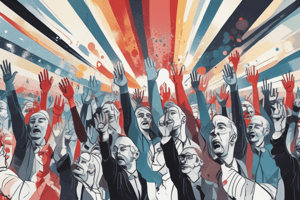Podcast
Questions and Answers
What principle ensures that no single branch of government holds excessive power?
What principle ensures that no single branch of government holds excessive power?
- Checks and Balances (correct)
- Executive Authority
- Separation of Powers
- Judicial Review
Which of the following best describes the primary purpose of the Bill of Rights?
Which of the following best describes the primary purpose of the Bill of Rights?
- To establish checks between branches
- To expand the powers of Congress
- To protect individual freedoms and rights (correct)
- To outline government structure
What does the 27th Amendment specifically address?
What does the 27th Amendment specifically address?
- State sovereignty issues
- Term limits for Congress members
- Changes in Congressional salaries (correct)
- Limitations on Presidential power
In what way can the Constitution be described as a living document?
In what way can the Constitution be described as a living document?
Which issue illustrates the limitations faced by states prior to the Constitution's enactment?
Which issue illustrates the limitations faced by states prior to the Constitution's enactment?
What does the term 'democracy' literally translate to from Greek?
What does the term 'democracy' literally translate to from Greek?
Which of the following is a characteristic of representative democracy?
Which of the following is a characteristic of representative democracy?
What is voter suppression aimed at achieving?
What is voter suppression aimed at achieving?
Which principle asserts that all individuals and institutions are accountable under the law?
Which principle asserts that all individuals and institutions are accountable under the law?
What concept underscores the importance of individual rights within American culture?
What concept underscores the importance of individual rights within American culture?
Which of the following contributed to the main weaknesses of the Articles of Confederation?
Which of the following contributed to the main weaknesses of the Articles of Confederation?
Civic duty includes which of the following responsibilities for citizens?
Civic duty includes which of the following responsibilities for citizens?
What is gerrymandering primarily intended to achieve?
What is gerrymandering primarily intended to achieve?
Flashcards are hidden until you start studying
Study Notes
Democracy Basics
- Originates from Greek words: "Demo" (people) and "Cratos" (power), meaning "rule by the people."
Types of Democracy
- Direct Democracy: Citizens directly participate in decision-making processes.
- Representative Democracy: Citizens elect representatives to make decisions on their behalf.
Gateways to Democracy
- Free Speech: Enables individuals to express opinions without fear.
- Voting: Key mechanism for citizens to choose leaders and influence laws.
- Media Access: Essential for information dissemination and promoting government transparency.
Barriers to Democracy
- Voter Suppression: Efforts to inhibit or deter voter participation.
- Gerrymandering: Manipulation of electoral boundaries to benefit specific political parties.
- Lack of Education: Low understanding of the democratic process impacts participation levels.
Enlightenment Influence on America
- Popular Sovereignty: Government power derives from the consent of the governed.
- Rule of Law: Ensures accountability and that all individuals are subject to law.
Liberty and Rights
- Protection of Rights: Safeguards individual freedoms from governmental interference.
American Culture’s Influence on Democracy
- Liberty: High value placed on personal freedoms.
- Equality: Belief in equal rights and opportunities for all citizens.
- Individualism: Emphasis on individual rights and self-reliance.
- Civic Duty: Encouragement for participation in community and civic life.
Duty as Citizens
- Voting: Essential participation in elections.
- Staying Informed: Importance of being knowledgeable about current issues.
- Obeying Laws: Requirement to adhere to legal rules and regulations.
- Serving on Jury Duty: Civic responsibility in the judicial process.
- Engaging in Conversation: Participation in discussions on societal issues.
Weaknesses of the Articles of Confederation
- Weak Central Government: Insufficient authority to enforce laws or levy taxes.
- No Executive Branch: Absence of leadership for law implementation.
- Interstate Disputes: State self-interest led to conflicts and ineffective governance.
- Economic Issues: Inability to manage commerce or address national debt.
Key Components of the Constitution
- Bill of Rights: First ten amendments protecting individual freedoms and rights.
- Amendments: Allow changes or additions to the Constitution.
Protection by the Bill of Rights and Constitution
- Bill of Rights Protections: Guarantees freedoms like speech, religion, assembly, fair trials, and protection against unreasonable searches.
- Constitution Framework: Establishes federal government structure, delineates powers, and introduces checks and balances.
Power Distribution Among Government Branches
- Checks and Balances: Ensures no single branch (Legislative, Executive, Judicial) can overpower the others.
Constitution as a Living Document
- Amendable Nature: Adaptable to address evolving societal issues.
Last Amendment
- 27th Amendment: Prohibits changes to Congressional salaries from taking effect until the next congressional session.
Studying That Suits You
Use AI to generate personalized quizzes and flashcards to suit your learning preferences.




